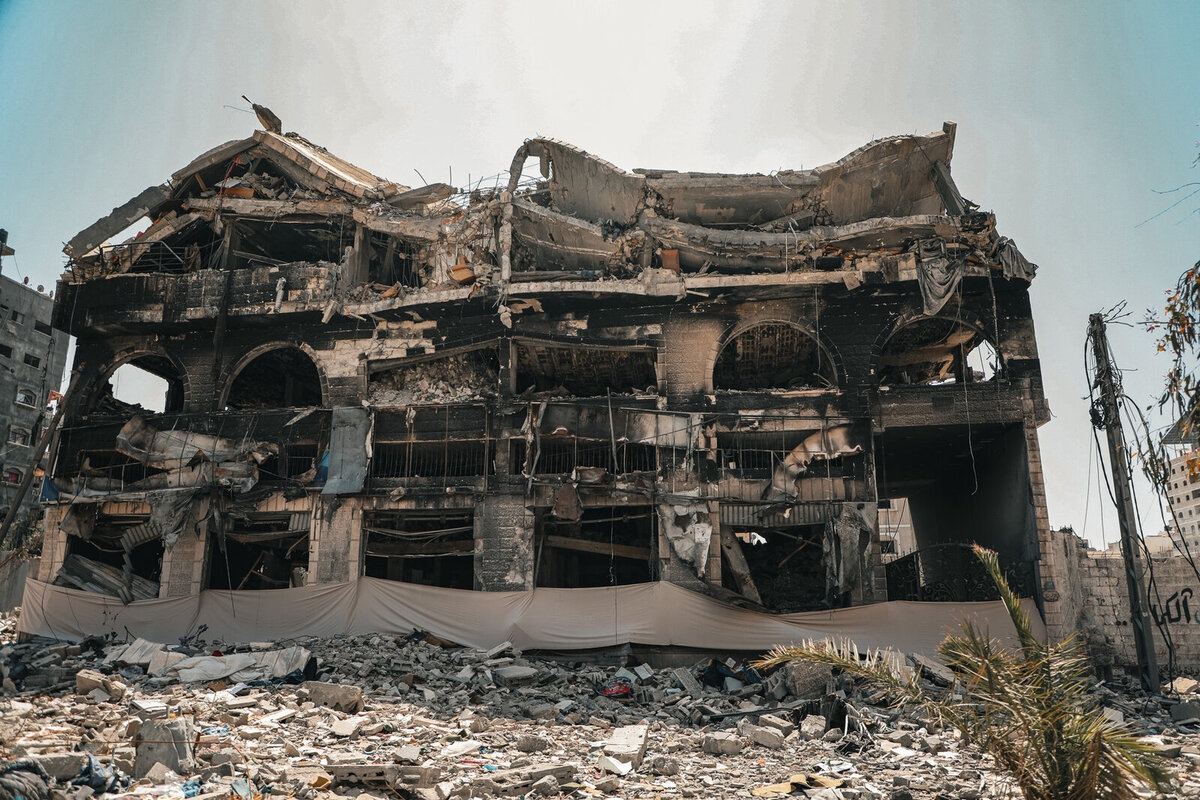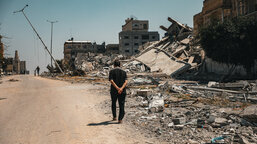After more than a year of war, a temporary ceasefire has been declared in Gaza. This has given residents hope of returning home and allowed for an increase in humanitarian aid deliveries. However, the situation remains critical. What impact has the conflict had, what do people in Gaza need most right now, and how is Caritas Czech Republic helping them? We discussed this with Kateřina Velíšková, Regional Manager for the Middle East at Caritas Czech Republic.
After 15 months of war, a temporary ceasefire has come into effect in Gaza. What does this mean for the local population?
The declaration of a temporary ceasefire primarily means that the fighting in Gaza has at least paused for a period of time. People who were forced to flee to central or southern Gaza can now, after many long months, return north to reunite with their families. The ceasefire also allows for an increase in humanitarian aid deliveries, which is crucial for the local population.
However, there remains a great deal of uncertainty. The ceasefire is only temporary, and no one knows what will happen after the six-week period ends. There are concerns that the conflict could reignite - perhaps even more intensely.
Another issue is what people are returning to in Gaza. According to statistics, up to 90% of buildings are either severely damaged or completely destroyed. Unexploded ordnance also remains a significant danger, posing a major risk when clearing debris.
Reconstruction will be an enormous challenge. Just the removal of rubble could take decades, not to mention the devastation of infrastructure, electricity, water supply, and sanitation systems. Basic services such as schools, hospitals, and public buildings are also missing, making any attempt to return to normal life extremely difficult.
The consequences of the conflict are devastating. In your view, what are the most significant ones?
I believe the statistics speak for themselves. The conflict has claimed 47,000 lives, and the vast majority of Gaza’s population has been displaced from their homes. Added to this is the 90% of buildings that have been damaged or completely destroyed. Schools have either not functioned at all or have operated in makeshift conditions. Many people have suffered injuries or severe health complications. Families have lost their savings and have no financial reserves. Not to mention the psychological consequences of the conflict, which will continue to manifest in the years to come.
The impact of the conflict is best seen in the personal stories emerging from Gaza. Take, for example, the story of a humanitarian worker Ahmed, who was forced to flee his home with his family in search of temporary shelter.
Humanitarian organisations continue to provide vital aid in Gaza. What does their work look like? Has the ceasefire made it easier to get aid to those in need?
The ceasefire has allowed for a significant increase in the volume of humanitarian aid reaching Gaza. While previously only a few dozen trucks entered daily, now there are hundreds. This is a crucial difference.
However, significant restrictions remain. There are still limitations on what can be imported into Gaza. Additionally, there is no stable local administration, and the security situation remains critical. This presents risks not only for the aid deliveries themselves but also for humanitarian workers and truck drivers transporting the aid.
Despite these challenges, essential supplies such as food and tents for displaced families are being distributed. However, the amount of aid needed still far exceeds available resources. The process of rebuilding will be long-term, and humanitarian needs remain immense.
Caritas continues to provide desperately needed assistance to the people of Gaza. What does this support look like in practice?
Caritas focuses primarily on providing primary healthcare. This means that Caritas is employing doctors and medical professionals who set up healthcare centres. In addition to medical assistance, we also provide psychological and psychosocial support - not only for adults but also for children, who have been deeply affected by the conflict. Caritas Jerusalem also provides financial aid.
The ceasefire presents an opportunity for a large-scale influx of humanitarian aid. What do people in Gaza need most right now?
Healthcare is absolutely essential for people in Gaza. One of the most urgent needs is rebuilding destroyed homes so that people have somewhere to return to and can begin rebuilding their lives. This is closely linked to the removal of rubble and, most importantly, unexploded ordnance, which, as I mentioned, poses a serious safety risk.
Rebuilding Gaza and the lives of its people will take many years. What do you think the post-war recovery will look like?
That is a very hard question. Post-war recovery is closely tied to the political situation, which is not clearly defined in the current ceasefire agreement. The way reconstruction unfolds depends on who will govern Gaza and how local administration will function. These factors will have a significant impact on how quickly and effectively the area can be rebuilt.
From the perspective of humanitarian organisations, the priority is to ensure that people in Gaza have dignified living conditions. This means access to basic necessities such as food, healthcare, and shelter. Only then can the gradual rebuilding of infrastructure and the economy begin, which is crucial for a return to normal life. However, this process will take many years.
The people of Gaza have endured immense suffering over the past 15 months. How can they be helped? And why is ongoing support so necessary?
The declared ceasefire is just the first step on a long road to recovery. During the active fighting, the situation was so critical that it was nearly impossible to get even basic aid into Gaza. Only now is it becoming possible to systematically deliver humanitarian assistance and start addressing the most urgent needs of the population. Given the scale of destruction, aid is still absolutely essential. People have lost their homes, access to basic services, and their means of livelihood.
People can continue to help by collection that Caritas Czech Republic is organising for Gaza.












